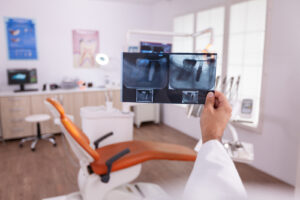At first thought, needing to undergo oral surgery probably seems scarier than other kinds of surgical procedures. After all, your surgeon must use tools inside your mouth, and that’s a very sensitive area. But the simple answer is that how major or minor oral surgery is all depends on why you need oral surgery.
The long answer will not only explain what oral surgery is, but will also review the process and the types of procedures. We hope this explanatory and educational tool will put your mind at ease as you prepare yourself for your own visit to an oral surgeon.
What is oral surgery?

Oral surgery is any procedure performed inside or around the mouth and jaw. These procedures require an oral surgeon like Dr. Andrew Greenberg, who is specially trained and has years of experience dealing with a wide range of oral surgical procedures and pain relief.
Patients who need oral surgery have at least one of a variety of oral health problems that only an oral surgeon can handle. But while you may think your oral surgery is major, not every procedure is major. In fact, many oral surgeries are minor or routine.
Types of Oral Surgeries
- Wisdom tooth extraction
- Gum and jawbone grafts
- Dental implants
- Biopsies
- Frenectomy
Are these oral surgeries major or minor?
Again, many oral surgical procedures are minor in nature, but the severity of your problem and your overall health condition will ultimately determine whether your surgery is major or minor.
Wisdom Tooth Extraction
Wisdom tooth extractions are one of the most common procedures an oral surgeon performs. The need for a wisdom tooth extraction arises when a tooth becomes impacted, which means it is stuck below the gums and is growing at an abnormal angle that affects the health of your gums and other teeth. Wisdom tooth extraction is a minor surgery unless there is an infection in your gums. In that case, the surgery becomes more than minor. Depending on how many teeth are extracted, the procedure could take as long as 90 minutes.
Gum Grafts
Gum surgery is a major procedure because it involves the gums. Surgery on the gums is performed to enhance or restore your smile. A gum graft involves placing new tissues where none exist or is receding, thus exposing the roots of your teeth and making them more sensitive or even painful. A graft restores your gums to protect your teeth and their roots. This procedure takes around 45 minutes to perform.
Jawbone Grafts
A jawbone graft involves taking human bone grafting material and placing it onto the jawbone to restore or strengthen the jaw if it is week or damaged. A jawbone graft takes up to 20 minutes to complete, and the regeneration of the new bone can take several months. This procedure is minor depending on the damage to the bone.
Dental Implants
Dental implants involve extracting one or more teeth and installing a titanium implant into the jawbone on which an artificial tooth or crown will be placed. It’s a common and minor procedure. Each implant takes 20 to 30 minutes to place.
Biopsies
If your dentist detects a suspicious lesion in your mouth, an oral surgeon removes a small piece of the tissue so it can be tested for oral cancer. A biopsy is a simple procedure, taking around 15 minutes from start to finish.
Frenectomy
A frenectomy is the removal of a muscle attachment inside the middle of the upper lip or under the tongue. It’s a common minor surgery that routinely takes 15 minutes or less to complete.
How do I know if I need oral surgery?
It’s not an easy call to make yourself, but some signs you may need the services of an oral surgeon include pain, swelling, fever, and other signs of an infection in your mouth. Obvious tooth and tissue damage may need treatment by an oral surgeon. In the end, your general dentist will be able to determine if you need an oral surgeon if you are not sure. Your dentist will then refer you to an oral surgeon. If you are experiencing an emergency, call an oral surgeon right away. Dr. Greenberg will always try to fit you in his schedule on the same day when an emergency occurs.
Preparing for Oral Surgery
Your ability to handle oral surgery and recovery afterward can be all in how you prepare for your procedure.
- Your oral surgeon will likely instruct you to refrain from eating or drinking anything for 8 hours prior to surgery if you are going to be put to sleep with general anesthesia.
- Create a clean and comfortable space for you to recover at home, including fixing your bed so you can sit at an incline position.
- Arrange for transportation home since some types of anesthesia will cause you to be incapable of driving safely.
- Wear short sleeves to help nurses take your blood pressure and place any IV lines.
- Ask any questions or share any concerns you have with your oral surgeon. The more you understand the procedure, the less anxiety you may feel.
- Arrive 20 to 30 minutes prior to your appointment to fill out last-minute paperwork or ask additional questions.
- Bring a container to store dentures, bridges, or other dental hardware you may have that may get in the way.
Call Dr. Andrew Greenberg Today!
Oral surgery can be minor or major. But an oral surgeon with years of experience and great skill can make a lot of difference in your treatment and recovery. Dr. Andrew Greenberg is a member of the American Association of Oral and Maxillofacial Surgeons and has more than 30 years of experience providing oral surgery to his patients, including humanitarian missions in Jamaica where he has performed oral surgical procedures to those in need. If you live in the Westchester area and need oral surgery, please call our Briarcliff Manor office at 914-762-3388 for current patients and 914-342-7782 for new patients or visit our website today!
View this post on Instagram

